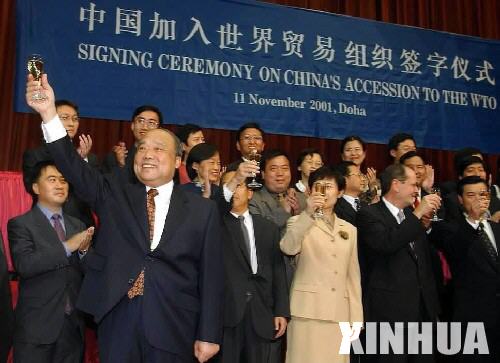16. 1997: The 15th National People's Congress of the CPC puts forward the basic line of the Party during primary stages of socialism
From September 12 to 18, the 15th National People's Congress of the Communist Party of China was held in Beijing, which put forward and expounded the basic guidelines of the Party during the primary stages of the socialism: Constructing the socialist economy with Chinese characteristics meant developing the market economy under the condition of socialism and constantly emancipating and developing productivity; managing the country and developing socialist democracy politics under the leadership of the CPC and under the basis that the people are the masters of their own country; constructing socialist culture with Chinese characteristics takes Marxism as guidance, aiming at training people so that they have high ideals, moral integrity, a good education and a strong sense of discipline, and to develop a national, scientific and popular socialist culture geared to the needs of modernization, of the world and of the future.
The line is a key part of Deng Xiaoping Theory. It is an extension of the Party's basic line in economy, politics and culture and is of great importance in mobilizing the Party and the people from all ethnic groups to unify together and strive to push the course of building socialism with Chinese Characteristics into the 21st century.
17. 1999: Confirming the public-ownership economy as a key part of the socialist market economy
From March 5 to 15, 1999, the Second Session of the 9th National People's Congress was held in Beijing. The session passed the Constitution Amendment of the People's Republic of China and clearly defined that the public-ownership economy, as a key part of the socialist market economy, has greatly propelled social productivity forward.
Since China began the reform and opening up policy in 1978, the country has experienced a procedure ranging from exploration to improvement in regard to the understanding of the non-public ownership economy.
In 1982, the 5th Session of the 5th National People's Congress passed the new Constitution after all-around amendment, confirming the legal status of individual economy and defining it as a supplement to socialist public-ownership economy.
In 1988, the 1st Session of the 7th National People's Congress passed the Constitution Amendment, adding the content that the country allowed the existence and development of private-owned economy under regulations and laws.
After the 14th National People's Congress of the CPC decided to carry out socialist market economy, the 1st Session of the 8th National People's Congress passed the Constitution Amendment in 1993, confirming the status and role of non-public-ownership economy.
In 1997, the 15th National People's Congress of the CPC brought non-public-ownership economy into the basic economic frame at the primary stage of socialism. The status of the non-public-ownership economy had been attached with unprecedented importance and gained recognition.
18: 1999: Put forward the Western Development Strategy
On March 22, 1999, the State Council, China's cabinet, put forward ten opinions of promoting development of western China.
The issue and implementation of the Western Development Strategy is conducive to fostering a unified national market and improving the socialist market economy system, and conducive to propelling the strategic adjustment on economic structure and the coordinated development of regional economies.
It is also conducive to improving the ecological situation, creating a better living environment and enhancing the development of the Chinese people.
19. 2001: China becomes a formal member of the World Trade Organization (WTO)
 |
Shi Guangsheng, then Minister of Foreign Trade and Economic Cooperation, toasts at the signing ceremony on China's accession to the WTO. |
On November 10, 2001, the Fourth WTO Ministerial Conference in Doha, Qatar, passed the legal documents for China to join the WTO, indicating that after 15 years of efforts, China finally became a new member of the WTO. China could now benefit from all the commitments made by the members of WTO at the Uruguay Round. China will enjoy positive results achieved by a multilateral trade system in promoting free trade and profit from multilateral, steady, unconditional most-favored-nation treatment. The rights China has are conducive to helping Chinese commodities enter the international market.
However, the entry of the WTO also brings challenges to the Chinese government and enterprises, setting forth new requirements for the government to speed up in changing its functions, governing the country according to laws as well as for enterprises to improve their technical levels, and speed up structural adjustments and improve the management of enterprises.